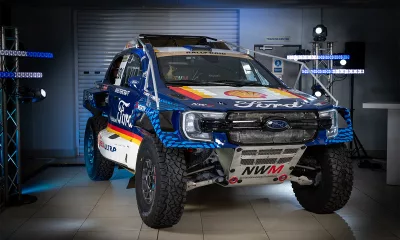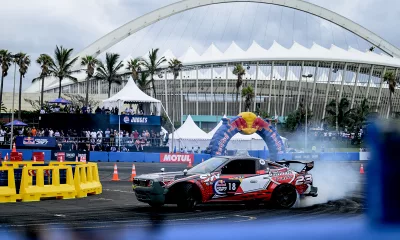The forthcoming Toyota 1000 Desert Race, round three of the Absa Off Road Championship, presents the five-car Kopanong Hotel Superteam with a huge logistical challenge, which takes weeks of preplanning to ensure that all arrangements are a success.
Apart from having to transport five racecars to the event there is also the issue of having to clothe, transport, feed and accommodate dozens of personnel, drivers and co-drivers from Thursday, June 10 to Monday, June 14.
Wherever possible the Kopanong Hotel Superteam camps in preference to staying in hotels and this involves sending an advance guard of personnel to set up the camp site, which can best be described as luxurious. A large inflatable structure is central to the campsite and utilised for dining purposes while a Bedouin-style tent provides an intimate lounge where resident musician, Dewald, nightly entertains team members and guests.
Feeding the 45-strong contingent is a mammoth task, which is undertaken by two chefs, two barmen and two helpers from the Kopanong Hotel and Conference Centre. The breakfast menu provides a variety of options ranging from fruit to cereals to muffins to a full English breakfast while lunch is picnic-style with team members provided with hampers containing a variety of nutritious snacks. The dinner menu is varied but usually includes a braai on at least one evening with pasta and curries also popular menu items.
The sleeping quarters consist of 25 tents of which five are equipped with two single beds, conventional bedding including duvets, bedside tables and lamps for the drivers and co-drivers. The remaining tents are equipped with camp beds and sleeping bags and for the ladies there’s a separate dressing room tent where they can do their make-up and hair as well as a toilet and shower trailer.
Probably the single biggest logistical task, or nightmare, is the transportation of the racing cars and equipment. Two vehicles, along with fuel, tyres, spares, equipment and tools, are transported in a 14 metre long fully enclosed trailer while the three remaining cars are transported to and from races on individual trailers. In total use is made of 12 vehicles ranging from a Mercedes Benz horse to Mercedes Benz Sprinters to a variety of 4×4 bakkies and SUV’s.
“Undertaking a project of this magnitude is definitely not for the feint hearted,” said Andre Botha from the Kopanong Hotel Superteam. “However, the advantages of camping by far outweigh the disadvantages as, apart from the significant savings on hotel accommodation, it has the positive effect of keeping the team under one roof, which builds team spirit.”
“Apart from the logistical challenge we have to face on each event there is also the competition aspect and here we have not had too good a start to the season with only one vehicle, Nic Goslar’s Kopanong Hotel Superteam Raceco, finishing and winning Class S on the Nissan Dealer 400 and the rest retiring due to a variety of problems.”
The Kopanong Hotel Superteam is hoping for a change in fortunes on the Toyota 1000 Desert Race, which takes place in Botswana from Jun 11-13 and will be relying heavily on last year’s winners, John Weir-Smith and Geoff Minnitt, to pull off a repeat win in the Class A Jimco.
With representation in Classes A, D, F and S it is not unlikely that the Kopanong Hotel Superteam crews could end up on the podium in each of the classes.
On the recent Nissan Sugarbelt 400 newcomers Chris Fick and Rob Knight were having a fine debut run in the Class D Land Rover but ran out of fuel while Andre Botha and Beans Heydenrych had Class F in the bag but blew their chances when they rolled the Chevy. Nic Goslar and Warren Bowie were leading Class S in the Raceco but missed the time bar by seven minutes and John Weir-Smith and Geoff Minnitt retired with fuel pump problems.




